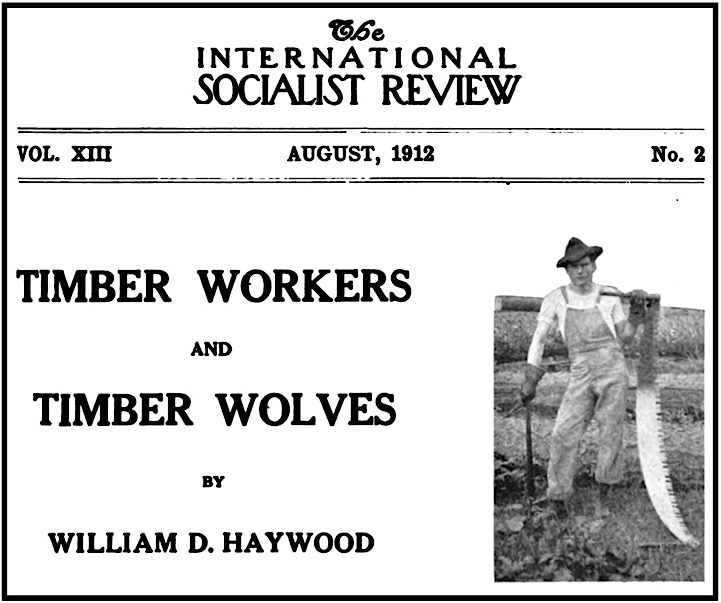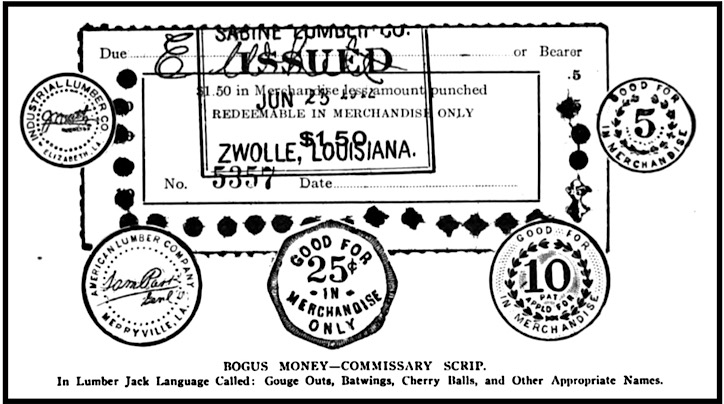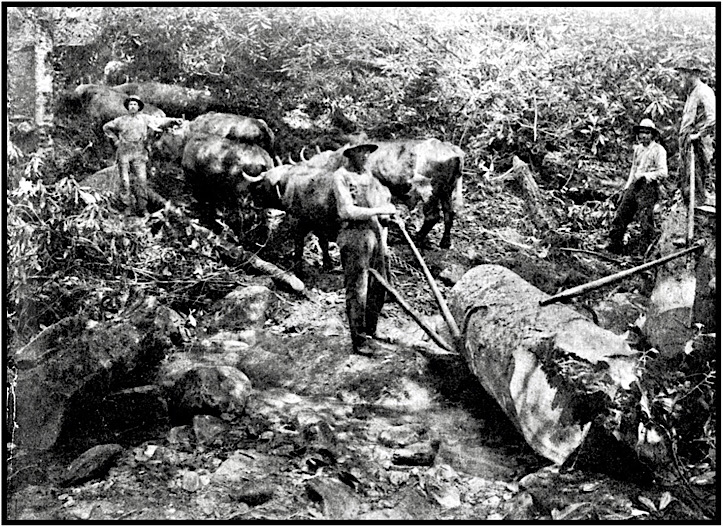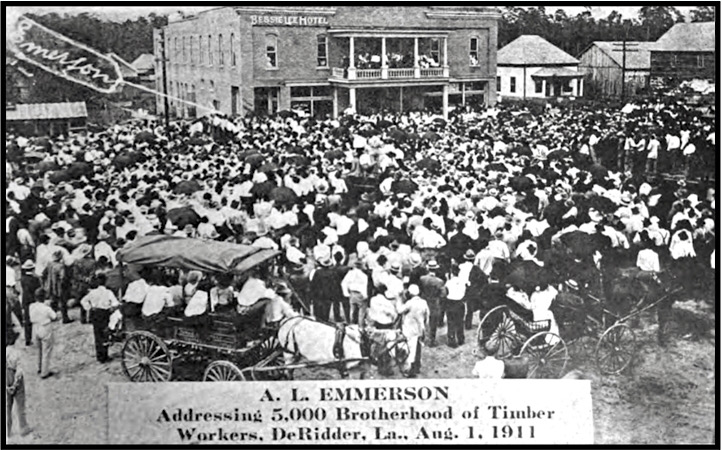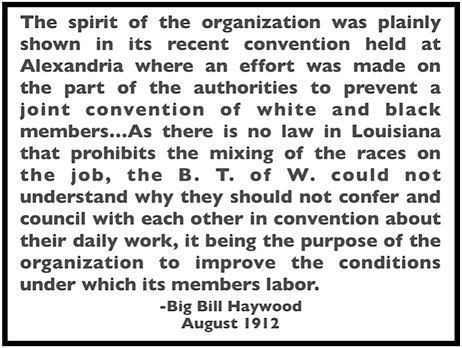 —————
—————
Hellraisers Journal – Friday August 2, 1912
Lake Charles, Louisiana – A. L Emerson, President of B. T. W., in Jail
From the International Socialist Review of August 1912:
[Part I of II]
A. L. EMERSON, President of the Brotherhood of Timber Workers, is in jail at Lake Charles, La. He was arrested following the shooting at Grabow, La., where three union men and one company hireling were killed outright and nearly two score of men were more or less seriously wounded.
The shooting is the outcome of the bitter war waged against the members of the Brotherhood of Timber Workers by the Lumber Trust for the last eighteen months. The scene of the tragedy that occurred on Sunday, July seventh, is a typical Southern lumber camp. The mill at this place is operated by the Galloway Lumber Company. In common with all others, it is surrounded by the miserable houses where the workers find habitation, the commissary store of the Company being the largest place of business in the towns. A strike has been on at this place since the middle of last May. The single demand on the part of the union men was for a bi-weekly pay day. Heretofore the pay days have been at long intervals-usually a month apart.
During the intervening weeks, when the men were in need of money to meet the necessities of life, they could secure advances on their pay but not in real money. They were compelled to accept Company Scrip payable only in merchandise and exchangeable only at the company commissary. If accepted elsewhere it is uniformly discounted from 10 to 25 per cent on the dollar.
In the commissary stores where the cash prices are always from 20 to 50 per cent higher than at the independent stores, the company has established another means of graft by making two prices-the coupon or scrip price being much higher than that exacted for real cash.
The conditions at Grabow can be used as an illustration of nearly all of the other lumber camps of the South.
The commissary store is not the only iniquity imposed upon the Timber Workers. For miserable shacks they [are] compelled to pay exorbitant rents; sewerage there is none; there is no pretense at sanitation ; the outhouses are open vaults. For these accommodations families pay from $5 to $20 a month. In one camp worn-out box cars are rented by R. A. Long, the Kansas City philanthropist, for $4 a month. Insurance fees are arbitrarily collected from every worker, for which he receives practically nothing in return, but whether his time be long or short-one day or a month-with the company, the fee is deducted. The same is true of the doctor fee and the hospital fee, which, in all places, is an imaginary institution. The nearest thing to a hospital that the writer saw was an uncompleted foundation at DeRidder, the place visited a few days prior to the Grabow tragedy. The gunmen and deputy sheriffs are an expensive innovation in the manufacture of lumber. These miserable tools are to be found everywhere and are used to browbeat and coerce the workers.
The lumber crews are hired without regard to color or nationality. In building up the Brotherhood of Timber Workers the officials of that organization have followed the lines laid down by the bosses and have brought into the ranks such persons as the bosses have employed. With wisdom and forethought they have refused to allow a discordant note to cause dissension in their ranks. This spirit of class consciousness aroused the ire of the lumber company to such an extent that no member of the Brotherhood of Timber Workers or the Industrial Workers of the World is given employment.
The spirit of the organization was plainly shown in its recent convention held at Alexandria where an effort was made on the part of the authorities to prevent a joint convention of white and black members. The Democratic officials of the county threatened to have an injunction issued or some other process of law invoked to prevent the body from coming together. As there is no law in Louisiana that prohibits the mixing of the races on the job, the B. T. of W. could not understand why they should not confer and council with each other in convention about their daily work, it being the purpose of the organization to improve the conditions under which its members labor.
After the Alexandria Convention adjourned, the first effort of the Timber Workers was to establish the semi-monthly pay day at Grabow. The demand was made of the company that pay day should come every two weeks. The demand was flatly refused and the strike followed and has continued since. The Galloway Lumber Company, the concern affected, tried to operate their mill in the meantime with non-union men who had been induced to fill some of the places of the striking timber workers. It was for the purpose of bringing these men into the organization that President Emerson, accompanied by a hundred or more members and sympathizers from DeRidder, went to Grabow.
While Emerson was addressing the crowd that had assembled a shot was fired from the direction of the lumber company’s office, which struck a young man standing by his side. This shot seemed to be the signal for a fusilade, coming not only from the office but from barricades of lumber and from the houses occupied by company thugs, one of whom stepped to the door and fired a shot which lodged in the abdomen of Bud Hickman, a farmer, who with his wife in his buggy, was trying to get away from the conflict.
Roy Martin and Gates Hall, two union men, were killed outright and A. W. Vincent, a company man, was also killed.
That the company was prepared and looking for an opportunity to make just such a murderous assault is evidenced by the fact that the office had been converted into an arsenal.
The first news received at New Orleans, which later reports seem to verify, was that managers, superintendents and gun-men from other lumber companies were ambushed in the Galloway Lumber Company office and that a wholesale slaughter of union men had been deliberately planned. That the murder of Emerson was intended is clearly shown by the fact that the man standing closest to him was the first shot down. Emerson was the desired victim. He had long been a target for the lumber barons’ hatred and venom.
Emerson is in jail, being held without bail at the time of this writing to await the action of the Grand Jury, that is to convene on the 15th of August. He is charged with murder on two counts. It will be proven in the course of time that his only crime is that of trying to lessen the burden and lengthen the lives of his fellow workers.
[Emphasis added.]
~~~~~~~~~~~~~~~~~~~~~~~~~
SOURCE & IMAGES
International Socialist Review
(Chicago, Illinois)
-Aug 1912, pages 105-10
https://www.marxists.org/history/usa/pubs/isr/v13n02-aug-1912-ISR-gog-ocr.pdf
See also:
Tag: Brotherhood of Timber Workers
https://weneverforget.org/tag/brotherhood-of-timber-workers/
~~~~~~~~~~~~~~~~~~~~~~~~~
There Is Power in a Union – Utah Phillips
Lyrics by Joe Hill

